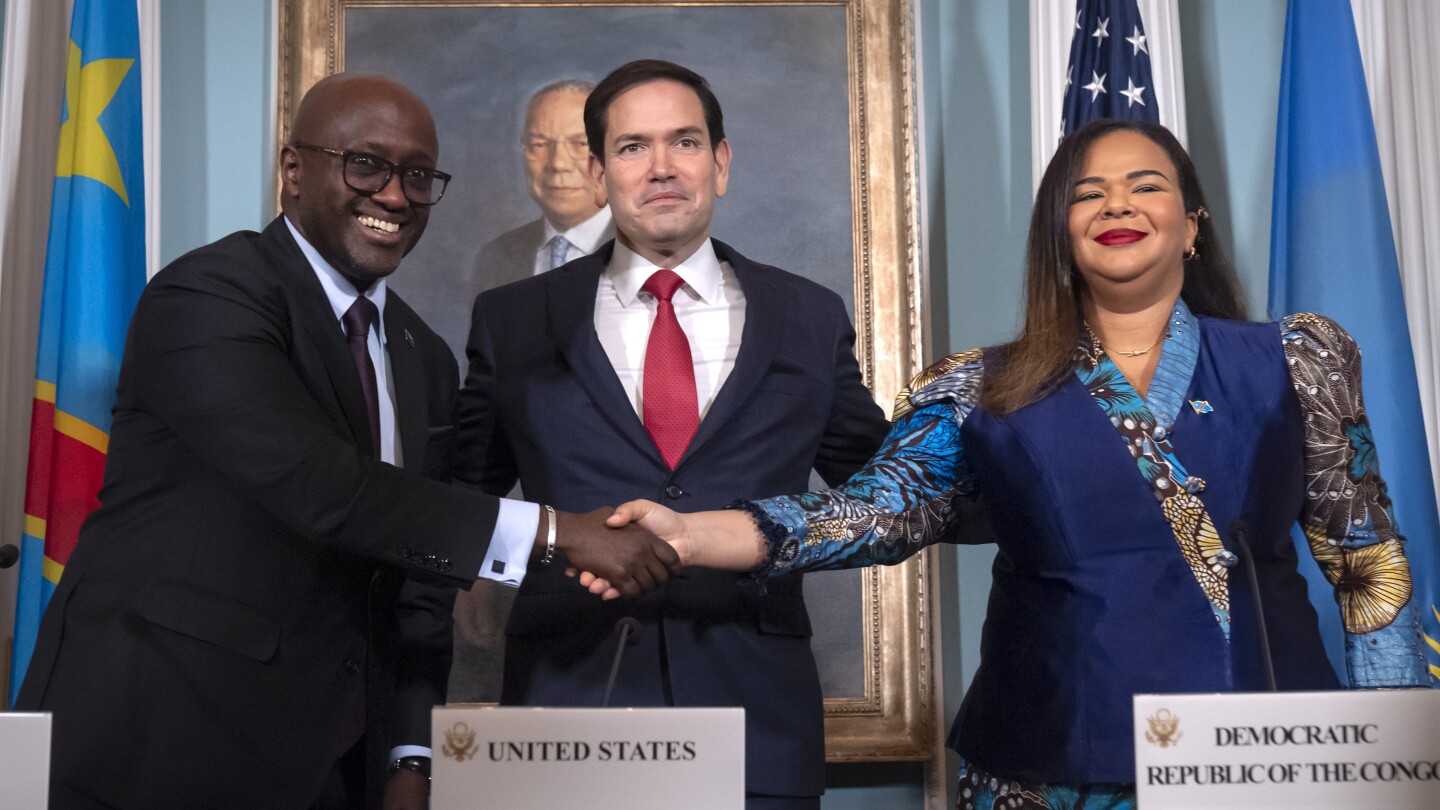WASHINGTON – The Democratic Republic of Congo and Rwanda have signed a U.S.-facilitated peace agreement aiming to end decades of deadly conflict in eastern Congo. The deal, announced on Friday, also opens pathways for the U.S. and American companies to access critical minerals in the region.
Immediate Impact
President Donald Trump, addressing the foreign ministers of both nations at a White House meeting, declared, “Today, the violence and destruction comes to an end, and the entire region begins a new chapter of hope and opportunity, harmony, prosperity, and peace.”
The agreement was formalized earlier at the State Department’s Treaty Room, with Secretary of State Marco Rubio describing it as “an important moment after 30 years of war.”
Key Details Emerge
The conflict in Congo, fueled by over 100 armed groups, has claimed millions of lives since the 1990s. While the peace deal marks a significant step, analysts caution that it may not immediately halt the fighting, as the most prominent armed group claims exemption from the agreement.
The Central African nation of Congo has been wracked by conflict with more than 100 armed groups, the most potent backed by Rwanda, that have killed millions since the 1990s.
Many Congolese view the deal as a strategic move by the U.S. to secure access to minerals crucial for global technology, following Congo’s request for American support against rebel forces.
Industry Response
Trump has emphasized the importance of gaining access to these minerals amidst growing competition with China for influence in Africa.
Congo’s Foreign Minister Therese Kayikwamba Wagner and Rwandan Foreign Minister Olivier Nduhungirehe expressed optimism but acknowledged the challenges ahead. “Some wounds will heal, but they will never fully disappear,” Wagner noted, emphasizing the need for respect and commitment to the agreement.
By the Numbers
With 7 million people displaced in Congo, the United Nations has called it “one of the most protracted, complex, serious humanitarian crises on Earth.”
What Comes Next
While the peace deal includes provisions for territorial integrity and the disarmament of non-state armed groups, the Rwanda-backed M23 rebel group has indicated that the agreement may not be binding for them.
Rwanda has been accused of exploiting Congo’s mineral wealth, used in products ranging from smartphones to fighter jets, although it denies any involvement. This complicates the peace process, as Rwanda’s interests in the region remain significant.
Expert Analysis
Christian Moleka, a political scientist at the Congolese think tank Dypol, described the deal as a “major turning point” but warned that it cannot resolve all conflict issues. “The current draft agreement ignores war crimes and justice for victims,” he said, highlighting the necessity for justice and reparation for lasting peace.
Regional Implications
The peace deal is central to the U.S. strategy to counter China’s influence in Africa, particularly in Congo’s mineral sector, where Chinese companies hold substantial sway.
According to sources, the U.S. Department of Commerce estimates Congo’s untapped minerals to be worth up to $24 trillion, underscoring the stakes involved in the peace process.
Timeline of Events
The conflict can be traced to the aftermath of the 1994 genocide in Rwanda, where Hutu militias killed between 500,000 and 1 million ethnic Tutsi, as well as moderate Hutus and Twa, Indigenous people.
Background Context
The ongoing conflict in eastern Congo, resulting in over 6 million deaths due to violence, famine, and disease, is rooted in historical tensions following the 1994 Rwandan genocide. The involvement of various armed groups and international interests complicates the path to peace.
As the region moves forward, the peace deal’s success will hinge on the commitment of all parties involved and the continued support of international partners like the United States and Qatar, who played a crucial role in facilitating the agreement.
Hope Muhinuka, an activist from Congo’s North Kivu province, reflected local sentiment, stating, “I don’t think the Americans should be trusted 100%. It is up to us to capitalize on all we have now as an opportunity.”
The path to peace remains challenging, but the agreement represents a significant step toward resolving a conflict that has long plagued the region.
Asadu reported from Dakar, Senegal. Edith M. Lederer at the United Nations, Justin Kabumba in Goma, Congo, Ignatius Ssuuna in Kigali, Rwanda, and Mike Pesoli and River Zhi-Hui Zhang in Washington contributed to this report.
